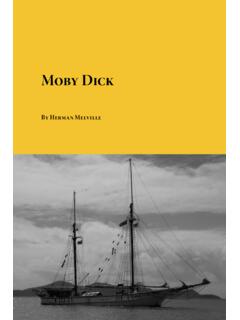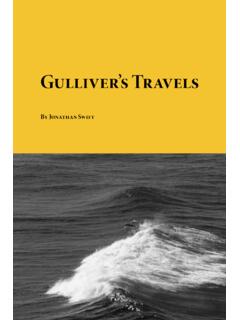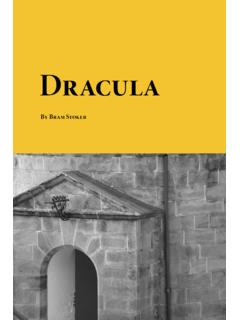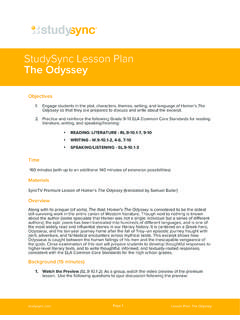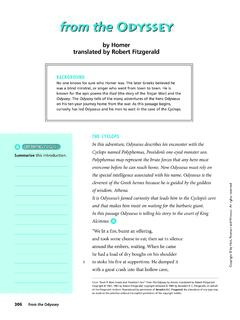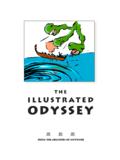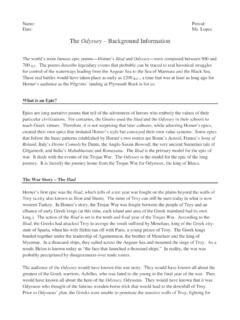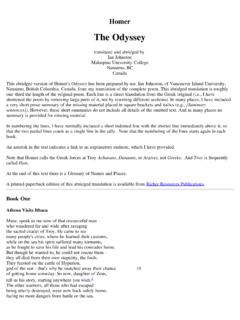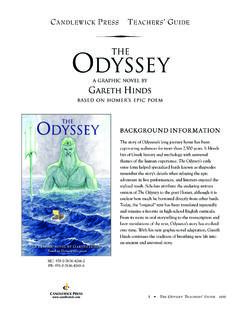Transcription of The Odyssey - planetebook.com
1 Download free eBooks of classic literature, books and novels at Planet eBook. Subscribe to our free eBooks blog and email Odyssey By Homer (Circa 700 BC) Translated by Samuel ButlerThe Odyssey Preface to First Edition This translation is intended to supplement a work enti-tled The Authoress of the Odyssey , which I published in 1897. I could not give the whole Odyssey in that book without making it unwieldy, I therefore epitomised my translation, which was already completed and which I now publish in shall not here argue the two main points dealt with in the work just mentioned; I have nothing either to add to, or to withdraw from, what I have there written.
2 The points in question are:(1) that the Odyssey was written entirely at, and drawn entirely from, the place now called Trapani on the West Coast of Sicily, alike as regards the Phaeacian and the Itha-ca scenes; while the voyages of Ulysses, when once he is within easy reach of Sicily, solve themselves into a periplus of the island, practically from Trapani back to Trapani, via the Lipari islands, the Straits of Messina, and the island of Pantellaria;(2) That the poem was entirely written by a very young woman, who lived at the place now called Trapani, and introduced herself into her work under the name of main arguments on which I base the first of these somewhat startling contentions, have been prominently and Free eBooks at Planet before the English and Italian public ever since they appeared (without rejoinder) in the Athenaeum for January 30 and February 20, 1892.
3 Both contentions were urged (also without rejoinder) in the Johnian Eagle for the Lent and October terms of the same year. Nothing to which I should reply has reached me from any quarter, and know-ing how anxiously I have endeavoured to learn the existence of any flaws in my argument, I begin to feel some confi-dence that, did such flaws exist, I should have heard, at any rate about some of them, before now. Without, therefore, for a moment pretending to think that scholars generally acquiesce in my conclusions, I shall act as thinking them little likely so to gainsay me as that it will be incumbent upon me to reply, and shall confine myself to translating the Odyssey for English readers, with such notes as I think will be found useful.
4 Among these I would especially call attention to one on xxii. 465-473 which Lord Grimthorpe has kindly allowed me to make have repeated several of the illustrations used in The Authoress of the Odyssey , and have added two which I hope may bring the outer court of Ulysses house more vividly before the reader. I should like to explain that the presence of a man and a dog in one illustration is accidental, and was not observed by me till I developed the negative.
5 In an appendix I have also reprinted the paragraphs explana-tory of the plan of Ulysses house, together with the plan itself. The reader is recommended to study this plan with some the preface to my translation of the Iliad I have given The Odyssey my views as to the main principles by which a translator should be guided, and need not repeat them here, beyond pointing out that the initial liberty of translating poetry into prose involves the continual taking of more or less liberty throughout the translation.
6 For much that is right in poetry is wrong in prose, and the exigencies of readable prose are the first things to be considered in a prose translation. That the reader, however, may see how far I have departed from strict construe, I will print here Messrs. Butcher and Lang s translation of the sixty lines or so of the Odyssey . Their translation runs:Tell me, Muse, of that man, so ready at need, who wan-dered far and wide, after he had sacked the sacred citadel of Troy, and many were the men whose towns he saw and whose mind he learnt, yea, and many the woes he suffered in his heart on the deep, striving to win his own life and the return of his company.
7 Nay, but even so he saved not his company, though he desired it sore. For through the blind-ness of their own hearts they perished, fools, who devoured the oxen of Helios Hyperion: but the god took from them their day of returning. Of these things, goddess, daughter of Zeus, whencesoever thou hast heard thereof, declare thou even unto all the rest, as many as fled from sheer destruction, were at home, and had escaped both war and sea, but Odys-seus only, craving for his wife and for his homeward path, the lady nymph Calypso held, that fair goddess, in her hol-low caves, longing to have him for her lord.
8 But when now the year had come in the courses of the seasons, wherein the Free eBooks at Planet had ordained that he should return home to Ithaca, not even there was he quit of labours, not even among his own; but all the gods had pity on him save Poseidon, who raged continually against godlike Odysseus, till he came to his own country. Howbeit Poseidon had now departed for the distant Ethiopians, the Ethiopians that are sundered in twain, the uttermost of men, abiding some where Hyperion sinks and some where he rises.
9 There he looked to receive his hecatomb of bulls and rams, there he made merry sit-ting at the feast, but the other gods were gathered in the halls of Olympian Zeus. Then among them the father of men and gods began to speak, for he bethought him in his heart of noble Aegisthus, whom the son of Agamemnon, far-famed Orestes, slew. Thinking upon him he spake out among the Immortals: Lo you now, how vainly mortal men do blame the gods! For of us they say comes evil, whereas they even of them-selves, through the blindness of their own hearts, have sorrows beyond that which is ordained.
10 Even as of late Ae-gisthus, beyond that which was ordained, took to him the wedded wife of the son of Atreus, and killed her lord on his return, and that with sheer doom before his eyes, since we had warned him by the embassy of Hermes the keen-sight-ed, the slayer of Argos, that he should neither kill the man, nor woo his wife. For the son of Atreus shall be avenged at the hand of Orestes, so soon as he shall come to man s es-tate and long for his own country. So spake Hermes, yet he prevailed not on the heart of Aegisthus, for all his good will; but now hath he paid one price for all.




